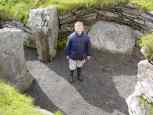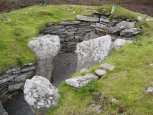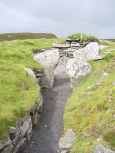 | Caithness.Org | Community | Business | Entertainment | Caithness... | Tourist Info | Site Map |
• Advertising • Chat Room • Contact Us • Kids Links • Links • Messageboard • News - Local & Scottish • News - UK & News Links • About / Contact Us • Submissions |
• Bookshop • Business Index & News • Jobs • Property For Sale • Property For Rent • Shop • Sutherland Business Index |
• Fishing • Fun Stuff • George, The Saga • Horses • Local Galas • Music • Pub Guide • Sport Index • What's On In Caithness |
• General Information • B & Bs • Backpackers • Caravan & Camping • Ferries • Getting Here • Holiday Letting • Hotels • Orkney • Pentland Firth • Sutherland • Taxis |
| N E W S F E E D S >>> |
Cairn Of Get
|
The burial monument has been a feature of the landscape for over five
thousand years. In the centre is a chamber in which the dead of
local communities were buried. The original monument was a small
round cairn with a central burial chamber. The chamber was entered
through a short low passage forcing the users to crawl in on their
knees. They first entered a small ante-chamber, defined by two
pairs of large upright stones. This feature is characteristic of
chambered tombs in this part of Scotland. The burial chamber would have been a much more impressive space when it was originally built. The walls would have risen over 3m before being sealed by the large lintels forming the roof. Unfortunately, by the time the tomb was excavated in the nineteenth century the roof had long since collapsed. The rubble from this collapse, however, sealed the burials which had been laid in the chamber. On the floor was a mass of burnt material including charcoal and fragments of human bone, which would suggest that the chamber had been used for cremations. Lying on top of this burnt layer were the unburnt remains of seven people accompanied by flint arrowheads, pots and animal bones. Sometime after the original construction of the cairn it was enlarged
and elaborated with the addition of projections or horns, forming
forecourts on the north and south sides. These forecourts were
used for ceremonies, but sadly no evidence for the type of ceremony
survives today.
|












